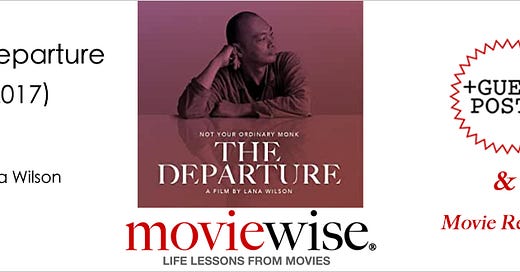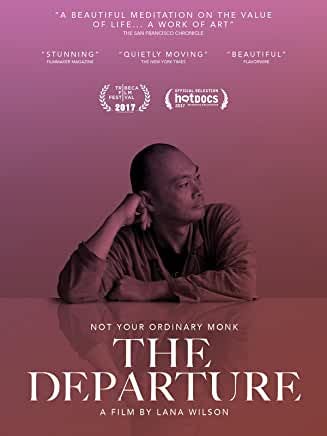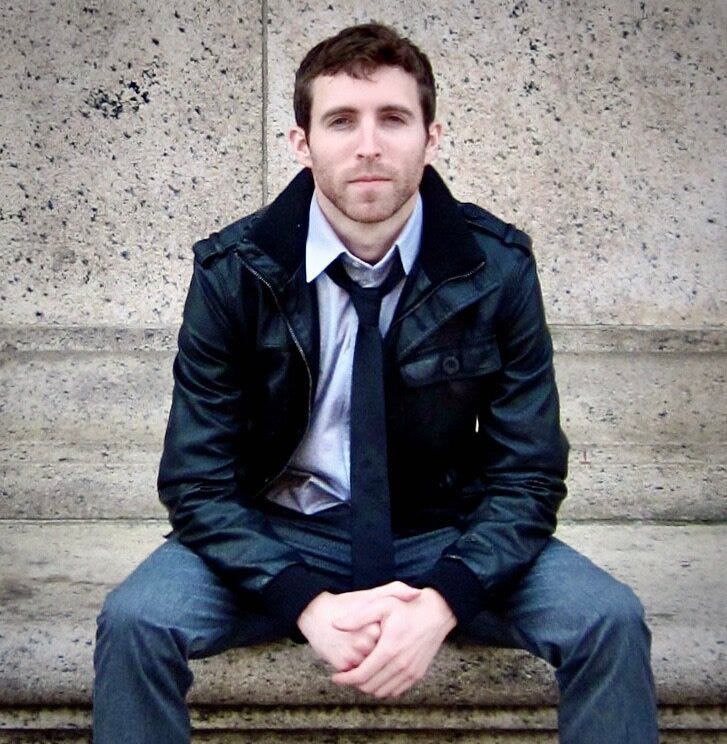"The Departure" (2017)—Create Hope
+Guest Posts: Movie Wisdom By Guest Writer Will Dowd—Issue #6
Image by L.E. Wilson from RedBubble
The Movie:
The Departure (2017) is a documentary co-written and directed by Lana Wilson about a Buddhist monk in Japan who counsels people that are suicidal.
Life Lesson: You have to decide, on your own, to take good care of yourself.
Grandfather: No matter who you ask advice from, in the end you have to make your own decision…
Guest Writer:
Guest writer Will Dowd discusses the moon in The Lunar Dispatch
I try not to have idols. At the advanced age of 37, I’m too jaded for hero worship. But then I saw The Departure, a documentary about the Zen Buddhist priest Ittetsu Nemoto who has made it his life’s work to minister to the suicidally depressed.
In his youth, Nemoto was a self-confessed punk. He drank, he fought, he sped through the world on his motorcycle—all speed, no clear purpose. But after a crash at age 24, he answered an ad in his local paper: Buddhist monk wanted.
He still rides a motorcycle and attends underground concerts at night, but now he—along with his wife and young son—lives in a temple in Gifu, Japan that is surrounded by rice paddies. Yet this environment is hardly paradise for Nemoto, who is contacted at all hours by people on the verge of suicide. He is a human guardrail, quietly diverting those who seek his help from taking their lives.
For a man who has saved countless lives, Nemoto is unfailingly humble. “I’ve learned through experience that I can’t save anyone,” he says. “I try to create an atmosphere that makes it possible for them to share their problems.”
His approaches vary, but they are remarkably experiential and counterintuitive. He holds workshops that help people focus on treasuring what will be lost by dying. To do this, he performs a mock funeral ceremony, giving them the visceral experience of death, which many find cathartic.
In one memorable exchange, a woman wonders why she should keep living because she can see no meaning to her existence and “there must be a reason for every human life.”
“Well, does there?” Nemoto responds. “I mean, does a river have a meaning?”
With so many people depending on his spiritual and therapeutic counsel to survive, Nemoto finds himself under intense stress. The Departure shows the toll his work takes on his body and family life. Can he continue to pursue his vocation? Or will he have to quit to save himself?
Beautifully directed by Lana Wilson, The Departure was my favorite film in recent years. In the age of Marvel, Ittetsu Nemoto is the most inspiring cinematic superhero I’ve seen. And he happens to be real.
Of course, the monk would bristle at being compared to a caped crusader. He doesn’t see himself as a savior. As he tells one man who complains of feeling hopeless:
Let’s create our own hope being together.
moviewise Review:
The 2017 movie The Departure is an embodiment of Alice’s lament in Alice in Wonderland (1951): “I give myself very good advice, but I very seldom follow it.” It is also a cautionary tale of sorts, or at least a reminder to be ware of abdicating responsibility.
At about the 26 minute mark, we are shown the facade of a hospital, and this film being about a Buddhist monk’s attempt to help suicidal people in Japan live another day, one assumes that we are going to see the monk visiting a newly admitted patient. But it turns out that the monk is there to get treatment for clogged arteries and enlarged lungs (pulmonary emphysema) that appear to be the result of his midnight wandering lifestyle, which includes staying up all night drinking, smoking, and clubbing. Meanwhile his very patient wife takes care of their toddler, without any help from the monk, who walks around their home consumed and stressed out by his phone, which rings incessantly as people with suicidal thoughts make a potentially final effort to contact him.
We don’t know how effective he is in preventing suicide, but he is certainly successful in encouraging dialogue, as he explains:
I’ve learned through experience that I can’t save anyone. I try to create an atmosphere that makes it possible for them to share their problems.
One of the exercises he conducts asks participants to think about what they would leave behind if they died: the most precious possessions they have, the most important people in their lives, and the opportunities that life affords like trying new things or continuing to do something they like. It is a method that can help develop gratitude and the ability to look beyond yourself and your inner turmoil.
Clearly the monk, Ittetsu Nemoto, is kind and well-meaning, but it is also obvious that he needs as much help as the people he’s ministering to. He is still haunted by and reeling from the suicides of three people close to him who died when he was young: his favorite uncle, a classmate, and a bandmate. They were all people he admired, looked up to, and seemed healthy. The monk struggles with trying to find an answer to the question: why did they feel they needed to die? It’s a poignant example of the kind of deep, painful scars that those affected by someone’s suicide carry with them.
The most instructive part of the movie is when the monk visits a young woman at her home who is feeling down and inquires about her grandfather. “Let’s learn from your grandfather,” he tells her. “We should both experiment and then come back here and report to your grandfather on how we’ve changed.” It soon becomes apparent that the monk is really there to get help himself, in the form of advice from the old man, who is probably the healthiest and happiest person in the whole film.
But the monk ignores the advice given by the 84-year-old and continues with his unhealthy behavior until he’s in the hospital getting heart surgery—fifteen minutes before the end of the film. It is then that the monk decides that he needs to reevaluate his priorities. So we circle back to the counsel from the one person who has real acquired wisdom to share. Although it doesn’t sound as fun as being self-indulgent and self-destructive, it is still very sage advice from the grandfather:
You have to look after yourself.
If you want help for suicidal thoughts please visit: The National Suicide Prevention Lifeline, American Foundation for Suicide Prevention, International Association For Suicide Prevention, The National Domestic Violence Hotline, HelpGuide, Give An Hour, Vets4Warriors, Mayo Clinic, or call the Substance Abuse and Mental Health Services Administration Disaster Distress helpline: 1-800-985-5990.
Want to publish your very own guest post on moviewise: Life Lessons From Movies and share with the world your most impactful, most wonderful, and most profound movies? Reply to this or leave a comment below to get started 🤗.
Visit the moviewise catalogue—a searchable database of one sentence movie summaries, movie quotes, and movie wisdom—for movie recommendations.
Also visit the moviewise store. Get a t-shirt, bag, or pillow with your favorite #LifeLesson from a movie. Reply to this or leave a comment below to make a request.











